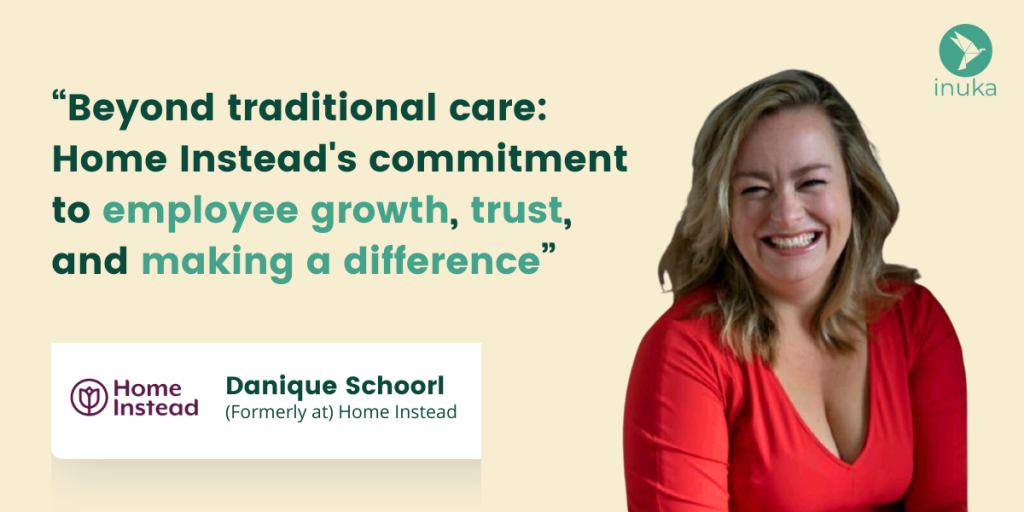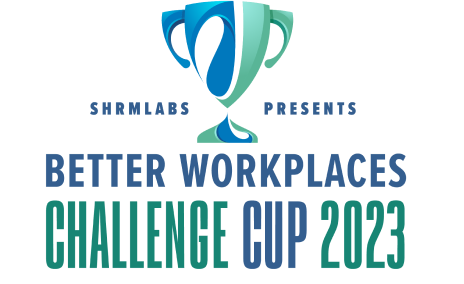Home Instead’s on employee growth and making a difference

Danique Schoorl, former Senior Human Resources Manager at Home Instead, shares her journey in HR, emphasizing Home Instead’s unique focus on creating a supportive work culture, integrating their core values of making a difference, working from the heart, and trust, to enhance employee well-being and vitality.
Danique, thank you for being here. Until recently you’ve been Senior Human Resources Manager at Home Instead, an inspiring company. Can you please introduce yourself, Home Instead and your previous role there as Senior Human Resources Manager a bit further?
Yes, until recently I worked at Home Instead, where I led the entire people domain in the Netherlands. Now Nelien Krijtenburg has taken over this role and I’m working as HR Director Benelux at Diversey, but let me tell you a bit more about Home Instead and what I did there.
We have over 3,000 caregivers and people working for us across the country. What we do is non-medical home care, which is different from traditional home care. We provide companionship, help with daily tasks like shopping, and various other services, but we don’t administer medications or provide medical care.
My background is quite diverse. I initially started within small, growing companies and transitioned into the HR field. I pursued my studies later on. Interestingly, my original training was as a therapist and psychologist, so I’ve always been fascinated by human behaviour. I’ve delved into understanding why we do what we do and how we function as individuals. Why do some things come naturally to one person and pose challenges for another?
When I was nineteen, I embarked on the path of hypnotherapy, which has become more accepted over time and is even used in hospitals now. However, back then, it was considered quite alternative, and I faced some scepticism. But that journey ultimately led me to where I am today, by connecting my interest in human behaviour, well-being, and health with the corporate world.
My previous experience in establishing a small-scale living initiative, navigating the complexity of various regulations, including personal budgets (PGB), healthcare authorities, and municipalities, allows me to understand the challenges faced by caregivers. It gives me an informed base from which to create a work environment where people can perform their caregiving duties with enthusiasm and excellence.

Could you give a brief insight in your organisation's philosophy about work, employees, well-being, and vitality, and which related strategies you have implemented?
We’ve been in the process of redefining our absenteeism policy. We’re highly engaged in reconfiguring the existing policy into a more contemporary framework, one that prioritises employee agency and autonomy.
Within our organisation we have three core values: “Make a difference,” “Work from the heart,” and “Trust.” Our aim is to further embed these core values into our HR policies. When individuals are empowered to work with autonomy and trust, knowing they have adequate support and opportunities for personal development, it often leads to positive outcomes. This endeavour also links to our focus on leadership. Having effective leaders who inspire and motivate, whilst skilfully balancing guidance with autonomy, freedom, and innovation. This is what we’re currently dedicating ourselves to as we shape our organisational approach.

You mentioned that you’re in the process of transforming your absenteeism policy. Can you elaborate?
Yes of course. We have a high absenteeism rate. In healthcare, absenteeism rates are generally very high, whilst at some of our sites this is an acute issue. So, we’re deep diving to investigate the underlying reasons. Especially since we value our employees, and we are hiring caregivers with all different kind of backgrounds. Also employees who are already retired, but still want to perform meaningful work.
Our primary focus is on developing a policy centered around individuals’ capabilities. In future it will be called the vitality (not absence) policy. Absenteeism often tends to revolve around the notion that someone is unwell or incapable of certain tasks. Our approach shifts that perspective towards what someone is capable of.
We consider aspects like mobility and career goals. Consequently, we’re emphasising job satisfaction, identifying strengths, determining potential areas for growth, and as a natural outcome, expecting a reduction in absenteeism.

What is your biggest frustration concerning employee well-being and vitality?
Privacy laws. Obviously, it’s a very important principle, that we respect the privacy of our employees. At the same time, it’s also challenging because you’re not allowed to inquire about anything. Ideally, from good employment practices, you’d want to be completely attuned to an employee’s situation, but you’re not allowed to ask. One employee may feel comfortable sharing certain things voluntarily, while another may not. That, I find challenging. So it’s not always possible to provide the best support because as an employer you are just not aware of every situation.

Do you have KPIs (Key Performance Indicators) related to well-being, and if so, what are they?
No, we’re not there yet. I’m looking for inspiration and I find it quite challenging. Because what do you measure? How do you measure it? You can certainly look at absenteeism figures and such, but that doesn’t measure well-being. So, the question is, how do you establish KPIs for that? I don’t have the answer yet.

When you try new interventions or add new providers, do you measure the results of these changes? If so, how?
Well, that somewhat depends on the KPIs we are currently searching for. For some things, it’s relatively easy. You can look at metrics like absenteeism or turnover, retention, and so on. These are, of course, metrics that you monitor, and ultimately, it does come down to them because if you have a high turnover rate or absenteeism rate, then you know that something isn’t going well within your organisation.

How is well-being strategically organised within your organisation?
It falls under my responsibility, I am in charge of everything within the People domain. This includes the academy, as well as the vitality coordinator, who also report to me. In our case, it’s more about People & Culture.
What I appreciate about the “People & Culture” aspect is that I believe it all comes down to leadership. Nevertheless, taking on a leadership role within the framework of remote work demands a unique set of skills. If you lack a full understanding of how this approach functions, or are hesitant to explore new methods, you end up sticking with what you know. If we don’t adapt and embrace preferred and culturally accepted working methods, we might not have any employees left in five to ten years.

In your career, which strategies or methods have worked really well in terms of employee well-being and vitality?
I’m deeply passionate about empowering individuals to have an active involvement in shaping their roles and how they fulfil them.
In a previous role, I introduced something called “bad mood days”, which actually worked quite well, even in reducing absenteeism. Alongside regular vacation days, I allowed employees to have two “bad mood days” each year. They could use these without providing a reason; they just had to ensure business continuity with proper handovers of their work. It was a way to take a day off when your child was sick or if you simply wanted a day to binge-watch Netflix or something similar.
I also believe that flexibility works really well for well-being. Giving people the space to blend work and personal life. There are so many expectations placed on all of us. Sometimes it just doesn’t add up. So, I think we should consider working fewer hours each week or, at the very least, provide employees with the flexibility to integrate work and personal life.
What doesn’t work is giving too much freedom because people might end up floating without direction, feeling unnoticed, and becoming insecure. That’s where it goes wrong. So, the key is to provide clear boundaries, establish well-defined goals, and let them operate within those boundaries with as much freedom as possible.

Do you have any concluding thoughts on well-being for other HR professionals?
When it comes to well-being, we all face the same challenges. I personally find that it all boils down to strong leadership; a people manager with whom employees feel safe, and a positive work culture where people can define their own roles and establish autonomy in their own way.

Vond je dit interview interessant?
Via onderstaande knop vind je nog meer interviews met business leaders van verschillende bedrijven. Wil je de interviews in jouw mailbox ontvangen? Registreren kan ook via onderstaande knop.
Mogelijk gemaakt door Inuka Coaching, een #BCorp en value-driven organisatie. Vanuit onze wetenschappelijke grondslag zijn we leidend op het gebied van evidence-based, digitale en datagedreven oplossingen die meetbare impact hebben op de vitaliteit en veerkracht van medewerkers.
Als onderdeel van onze missie 'Everyone resilient’, streven we ernaar om waardevolle content aan te bieden om het strategische denken in het welzijn van werknemers te bevorderen en een levendig en groeiend peer-netwerk van leiders te faciliteren. Dit omdat we zo allemaal sneller leren en samen meer bereiken! Word lid van ons peer-netwerk van leiders gericht op welzijn, registreer je hier!
Vind je dit bericht interessant? Deel het met je connecties!


